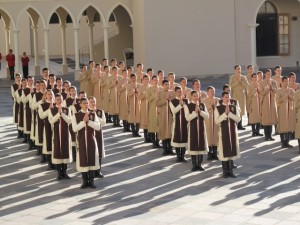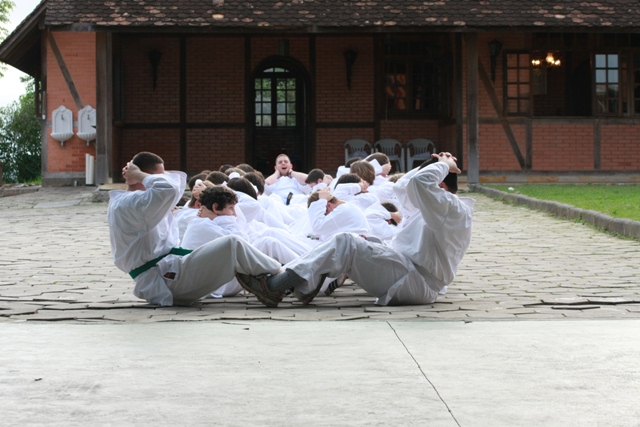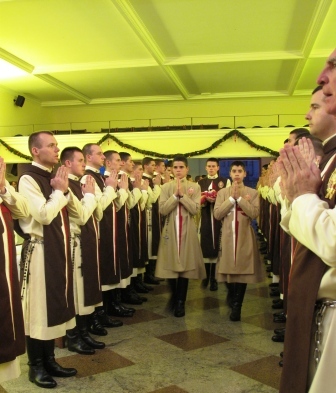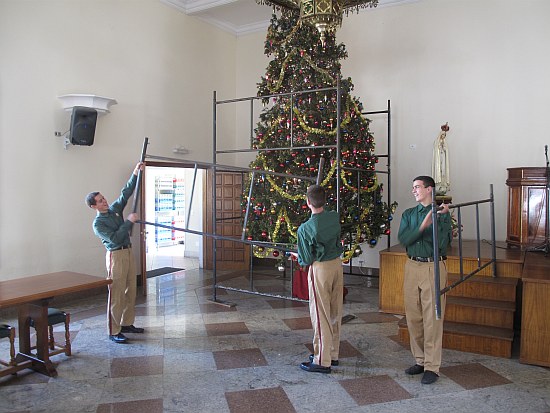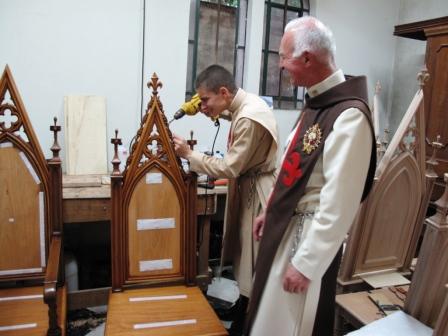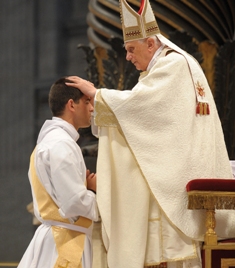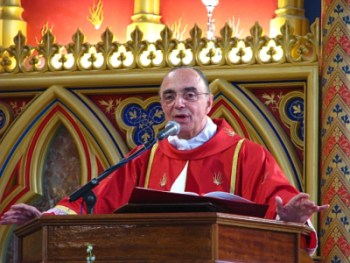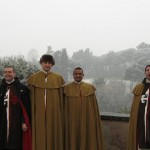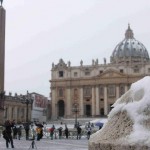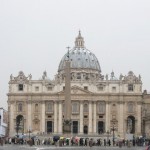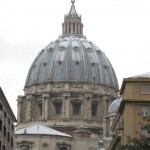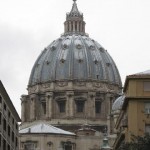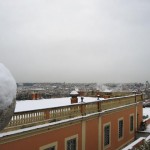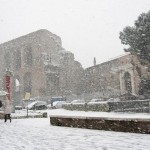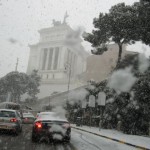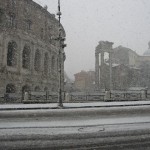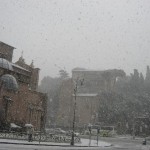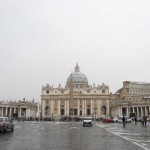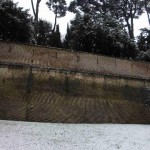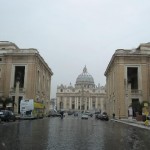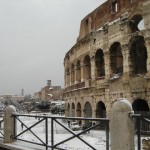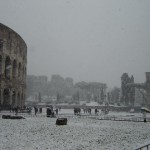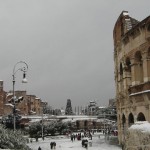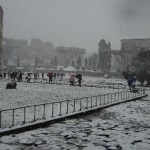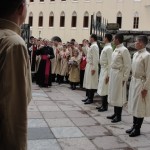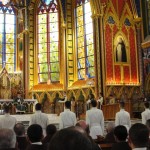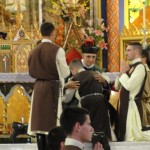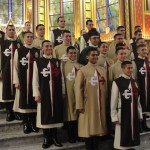13 de Mayo – May 13th

FIESTA DE NUESTRA SEÑORA DE FATIMA
Misa celebrada por el nuevo sacerdote, Rev. Padre Juan Villanueva, E.P
Lunes, 13 de Mayo 2013
En la Co-Catedral of the Sacred Heart
1111 St Joseph Pkwy, Houston, TX 77002
6:15 Rosario, Consagración y Coronación
7:15 Santa Misa
El neo-sacerdote saludará a los fieles al final de la Misa.
Organizado por Los Heraldos del Evangelio, tel 281-597-8178
The 1st church of the Heralds of the Gospel is now a Basilica

The first church of Heralds of the Gospel (in the International Seminary of the Heralds’ priestly branch, the Society of Apostolic Life of Pontifical Right Virgo Flos Carmeli) has been made a basilica by Pope Benedict XVI. The Basilica is named Our Lady of the Rosary. If you look at the pictures, the exterior is not even completed and yet the Holy Father bestows this honor. Inside it some improvements are also in the works. Here follows an translated excerpt of the news reported by Gaudium Press:
“With the Supreme Apostolic power, perpetually, we elevate the Church of Our Lady of the Rosary to the rank and dignity of Minor Basilica”
These words read yesterday from Benedict XVI’s Apostolic Brief brought joy and hope for the institution of the Heralds of the Gospel.
The feast of Our Lady Help of Christians was doubly celebrated by the Heralds of the Gospel. In addition to the normal celebrations in praise and honor of the Holy Mother of God, Help of Christians, there was something very special to be celebrated: The Church of Our Lady of the Rosary, in the Diocese of Bragança Paulista was elevated to the rank of Minor Basilica, just that day .
This church is part of a group of buildings which include the seminary of the Clerical Society Virgo Flos Carmeli and the House of Formation of the Heralds of the Gospel.
The ceremony of the presentation of the Apostolic Brief that raised the church to the status of Minor Basilica proceeded with great solemnity during the Mass celebrated by Bishop Sergio Aparecido Colombo , Bishop of Bragança Paulista, in São Paulo.
The Brief of His Holiness was presented to Msgr. João Clá Dias, founder and general president of the Heralds of the Gospel. Then the proclamation of the Holy Father’s words followed.
At the end of ceremony the unveiling of the symbols that identify a Minor Basilica, the Papal Coat of Arms, the Coat of Arms of the Bishop and the Papal Keys.
The Apostolic Brief
“Given at Rome, at St. Peter’s, under the seal of the Fisherman, on April 21st in the year 2012, the eighth of Our Pontificate.”
Thus ends the Papal decree that was made known by Cardinal Tarcisio Bertone, Secretary of State of the Holy See.
In it “His Holiness Pope Benedict XVI — Ad perpetuam rei memoriam –” affirms “among the sacred temples of the Diocese of Bragança Paulista in Brazil, stands out, deservedly, the Church of Our Lady of the Rosary, erected in the city of Caieiras, to which the faithful of the region tend to go to implore the powerful help of She who is Full of Grace, to guide their existence according the precepts of the Gospel.
For this reason, since the Venerable Brother Sergio Aparecido Colombo, bishop of that See, with the letter of the 1st of March of this year, in the name of the clergy and also the people, requested that we should honor this temple with the diginity of Minor Basilica, We, wishing to give proof of our special benevolence, with supreme satisfaction of those ferverent prayers, judge that it should be granted.”
Thus it is that the Holy Father says still “fully met the requirements that the Congregation for Divine Worship and the Discipline of the Sacraments, with the powers granted by Us, established for this subject,With the Supreme Apostolic power, perpetually, we elevate the Church of Our Lady of the Rosary to the rank and dignity of Minor Basilica, conferred all the rights and liturgical concessions that properly belong to the sacred edifices honored with this title, observing what is determined by the Decree De titulo Basilicae Minoris, promulgated on the 9th of November, 1989.”
And the Supreme Pontiff continues: “We are confident that the honor given shall prompt the hearts of the faithful to venerate even more the Holy Mother of God and the Church. We desire that this letter take effect from now and for posterity, being revoked any provisions to contrary.”
no images were found
Our Lady of the Resurrection

Image of Our Lady of the Ressurection, the invocation of the original name of the House of Formation, Hermitage of Our Lady of the Resurrection

A detail of the living room lights

A community living room in the seminary of the Heralds
Celebration of the 95th Aniversary of the apparition of Our Lady in Fatima – Mother’s Day
no images were found
click to see
Mass of May 13, 2012 at the Parish of Prince
of Peace in Houston, Texas. Eleven new companions were received and a large
number of people made their Consecration to Jesus Christ through the hands
of Mary, according to the method of St. Louis Grignion de Montfort.
Press Release – Apostolic Vicariate of San Miguel de Sucumbios
On Wednesday, May 11th in Quito, the administration of the Vicariate had a meeting with Bishop Ángel Polivio Sánchez, Bishop of Guaranda, secretary of the Ecuadorian Episcopal Conference and Pontifical Delegate for the Apostolic Vicariate of San Miguel Sucumbíos. In this meeting the painful economic situation that the Vicariate is in was discussed, and the critical situation of “Radio Sucumbíos, which legally belongs to the Catholic Church in Sucumbíos.
The lack of means to continue to maintain about 20 employees of Radio Sucumbíos that cost just over 12 thousand dollars a month and the lack of income for the radio itself to mantain them have forced a series of administrative measures to be taken. Indeed, in 2010 the Radio ended with a deficit of 27 thousand dollars and a labor lawsuit that has persisted since the previous administration for $ 28 000. And the outlook for 2011 is that there will be 80 thousand dollars of deficit.
The main concern of the administration of the Vicariate was that there was no interruption in the activities of the Radio, given the important role that has always been in favor of the people. And the only way I found to keep running the radio was to promote the reduction of staff, and replacing employees with volunteers.
Consequently, the administration of the Vicariate of Sucumbíos proceeded today to personally hand over a memorandum to dismiss employees of the radio. And despite having been peaceful and calm and after I had expressed in a meeting with them this situacion, they not only have not accepted this provision, but have called a few supporters who have acted illegally to take the radio and proceeded to expel the representatives of the Vicariate with physical attacks and insults.
The procedure the Administration used is the legally established one, since the memos to notify employees, have been signed by the legal representative, Bishop Angel Polivio Sanchez . Wages of April were complete, and were offered a check in settlement until the present date with summary dismissal, with everything according to the law, previously established by the Labour Inspectorate. Yet, employees not only refused to sign the dismissal, but alleged a presumed illegality of the procedure, and even rejected the same checks that were offered.
The Vicariate Administration officials now seek the compliance of the law. The aim of the new administration is to keep the radio with all the social support made through voluntareers, religious and less employees, so as to allow to mantain it from the economic point of view.
Nueva Loja, May 16, 2011
Catholic Youth
God grants His children some rest from arduous work and studies.While we can never stop advancing towards the goal, legitimate rest gives us energy to go forward with more energy than before, for His glory, in the service of Our Blessed Mother and the Holy Church.If we serve Him with all our heart and capabilities we will better know that joy of having fulfilled our duty and having that smiling gaze of Our Mother, the Blessed Virgin Mary upon us.
Singing of the Office
The Heralds of the Gospel reunite every Sunday to sing the Liturgy of the Hours or the Divine Office. It takes place in the church of the Seminary, Our Lady of the Rosary church.
Thabor – Elevation and Discipline II
…continued from previous post
Man is both body and soul. The angels shine contemplating God and singing His praises in pure spirit, but man with his body as well. His actions, every beat of his heart should give glory to God.
Man in Paradise had a perfect nature. All he did was orderly and pleasant to God. But with original sin, the situation changed …with labor and toil shall you eat thereof all the days of your life… (Genesis 3:17)
No longer are all things in man subject to God’s will. Man is burdened by disorderly passions. He must fight against inclinations towards evil, as he was cursed to a fallen nature.
“For you are dust, And to dust you shall return. …”
Oh how we are subject to that just sentence! At every instant our flesh calls us despise the law written in the bronze of our souls! Even worst, not only the flesh, but the Devil and the World conspire against our salvation, against our union with God! How can we maintain our minds in Heaven when our feet are dragging?
Of course, for man that is impossible. Only with God’s grace can man stably practice the 10 commandments. St. Thomas teaches us that while a man is capable of doing some ethical or moral good, supernatural good is only with His Grace.
But graces come in many forms. To simplify, we’ll use an example used a lot demonstrate the difference between sufficient grace (gratia mere sufficiens) and efficacious grace (gratia efficax).
Sufficient graces are those that give the person the possibility to do good.
A man who wants to cross a river needs a boat, oars and the strength to do so.
It is analogous to a man who wants to practice good. He needs grace. God gives it.
But when the current is stronger than normal? When the task at hand is so much more difficult than the common situation? More help is needed.
There God not only gives you oars, but He shall push the boat towards the goal.
Of course, man always has free will, but isn’t it hard to row against a hurricane of graces?
When God sends His winds, at most you need to open the sails to reach the goal. Sometimes not even that. How many wonderful stories about mystics could we tell? They saw the most sublime things, as if ascended into Heaven. But not only they, but every person, at one point in their lives, was subject such a grace, in a greater or lesser degree.
But the journeys of a Catholic are not always full of winds that push towards the Heavens. How many times have we found ourselves in a dark night, and the boat slipping from our control?
Does God abandon us? No, absolutely not! Does the mother abandon the child when she puts the child down from her arms and gives it her hand as it may walk on its own feet? No, God helps us in the same way, as we may be strengthened. He shall always be there. Even St. Paul begged God to take Him in His arms as the mother takes child the child and carries it where she wishes and protect it. But the Lord told him, as we read in 2 Corinthians 12: My grace is sufficient for you: for power is made perfect in infirmity.
This is where discipline comes in. Our small contribution to the action of grace. A man must put order into his life in so that he may triumph over his worst enemy: himself. To defeat all his evil inclinations he needs both grace and a bit of effort (Or sometimes a lot!) . “Pray as though everything depended on God. Work as though everything depended on you.” – St. Augustine.
He needs to make efforts to strengthen his will. Waking up early and having schedules to follow make a Herald use his time wisely and efficiently. Practicing ceremonials, be it for mass or the muster of the Credo before classes or even the cortege from dinner to Complines, helps the body discipline its movements to make them dignified movements yet leaving the mind open to reach the highest contemplations that grace proportions when we are properly disposed for them. If angels had bodies… imagine it…we want to imitate them!
Washing dishes, cleaning, exercise, silence, early wake-up, lights out, drills, music practice, Marian missions (will be the subject of future posts), parish duties, community admonishments, chapters of faults, studies, strong reading habits and being expected to always do everything with a love for perfection creates habits that end up forming ideas, that then forms mentalities and finally forms saints. All this next to an intense spiritual life make a seminarian ready for anything and willing to go and do anything that Holy Church needs of him. At a young age, obedience already becomes way of life, making him capable of things others aren’t. Living in community, having to follow an Ordo of Customs (again, we hope to write on it later) and constantly having to dominate their will and put it the hands of another make a seminarian be ready for those times that God hands us “just an oar” to give us merits. These habits end up being connatural to the person, allowing him to fly when life weights down. Without discipline, when aridness begins to ail a soul, it succumbs and is incapable of elevating the minds to God. When God sends His winds to push us towards great things and great horizons to “Put out into deep water” (Luke 5:4 ) it is easy to elevate your mind towards Him. But when He wants us to suffer the apparent abandonment as He Himself suffered to make us grow, we need to be ready for it. An athlete who wants to win a race can’t rely on having a “good day” . He has to train for it. The path towards sanctity is not always full of bright skies and and soothing winds. Sometimes it goes through dark knights and heavy storms. With discipline, overcoming those trials, always with God’s grace, becomes possible, being able to always keep the celestial objective in sight and on the path towards it.
Let us all discipline ourselves, above all in our prayer life, so we can one day with great joy say: I have fought a good fight: I have finished my course: I have kept the faith!
International Theological Convention “Faithfulness of Christ, Faithfulness of the Priest” – Convegno Teologico
from: http://www.annussacerdotalis.org/ To see video: http://www.convegnoteologico.org/Communiqué on the Internet transmission
of the
International Theological Convention
“Faithfulness of Christ, Faithfulness of the Priest”
Rome, March 11-12, 2010
We would like to inform you that the International Theological Convention
“Faithfulness of Christ, Faithfulness of the Priest”, promoted by the Congregation
for the Clergy, to be held at the Aula Magna of the
Pontifical Lateran University
on March 11-12 2010, will be transmitted on this website, on which it will be
possible to follow proceedings of the various conferences.
Phrase of the Day February 12, 2010
“Caprice leads to bitterness and the spirit of criticism”
Msgr. John S. Clá Dias 02.12.2010
“O capricho leva à amargura e ao espírito de crítica!”
Msgr. João S. Clá Dias (12/02/2010).
A view of the house of the Heralds of the Gospel in Ponta Grossa
A nice picture we received from the Heralds in Ponta Grossa

A view of the hall of Mater Divinae Gratiae in the house of the Heralds in Ponta Grossa
MESSAGE OF HIS HOLINESS POPE BENEDICT XVI FOR THE 44th WORLD COMMUNICATIONS DAY
MESSAGE OF HIS HOLINESS
POPE BENEDICT XVI
FOR THE 44th WORLD COMMUNICATIONS DAY
“The Priest and Pastoral Ministry in a Digital World:
New Media at the Service of the Word”
[Sunday, 16 May 2010]
Dear Brothers and Sisters,
The theme of this year’s World Communications Day – The Priest and Pastoral Ministry in a Digital World: New Media at the Service of the Word – is meant to coincide with the Church’s celebration of the Year for Priests. It focuses attention on the important and sensitive pastoral area of digital communications, in which priests can discover new possibilities for carrying out their ministry to and for the Word of God. Church communities have always used the modern media for fostering communication, engagement with society, and, increasingly, for encouraging dialogue at a wider level. Yet the recent, explosive growth and greater social impact of these media make them all the more important for a fruitful priestly ministry.
All priests have as their primary duty the proclamation of Jesus Christ, the incarnate Word of God, and the communication of his saving grace in the sacraments. Gathered and called by the Word, the Church is the sign and instrument of the communion that God creates with all people, and every priest is called to build up this communion, in Christ and with Christ. Such is the lofty dignity and beauty of the mission of the priest, which responds in a special way to the challenge raised by the Apostle Paul: “The Scripture says, ‘No one who believes in him will be put to shame … everyone who calls on the name of the Lord will be saved.’ But how can they call on him in whom they have not believed? And how can they believe in him of whom they have not heard? And how can they hear without someone to preach? And how can people preach unless they are sent? (Rom 10:11, 13-15).
Responding adequately to this challenge amid today’s cultural shifts, to which young people are especially sensitive, necessarily involves using new communications technologies. The world of digital communication, with its almost limitless expressive capacity, makes us appreciate all the more Saint Paul’s exclamation: “Woe to me if I do not preach the Gospel” (1 Cor 9:16) The increased availability of the new technologies demands greater responsibility on the part of those called to proclaim the Word, but it also requires them to become become more focused, efficient and compelling in their efforts. Priests stand at the threshold of a new era: as new technologies create deeper forms of relationship across greater distances, they are called to respond pastorally by putting the media ever more effectively at the service of the Word.
The spread of multimedia communications and its rich “menu of options” might make us think it sufficient simply to be present on the Web, or to see it only as a space to be filled. Yet priests can rightly be expected to be present in the world of digital communications as faithful witnesses to the Gospel, exercising their proper role as leaders of communities which increasingly express themselves with the different “voices” provided by the digital marketplace. Priests are thus challenged to proclaim the Gospel by employing the latest generation of audiovisual resources (images, videos, animated features, blogs, websites) which, alongside traditional means, can open up broad new vistas for dialogue, evangelization and catechesis.
Using new communication technologies, priests can introduce people to the life of the Church and help our contemporaries to discover the face of Christ. They will best achieve this aim if they learn, from the time of their formation, how to use these technologies in a competent and appropriate way, shaped by sound theological insights and reflecting a strong priestly spirituality grounded in constant dialogue with the Lord. Yet priests present in the world of digital communications should be less notable for their media savvy than for their priestly heart, their closeness to Christ. This will not only enliven their pastoral outreach, but also will give a “soul” to the fabric of communications that makes up the “Web”.
God’s loving care for all people in Christ must be expressed in the digital world not simply as an artifact from the past, or a learned theory, but as something concrete, present and engaging. Our pastoral presence in that world must thus serve to show our contemporaries, especially the many people in our day who experience uncertainty and confusion, “that God is near; that in Christ we all belong to one another” (Benedict XVI, Address to the Roman Curia, 21 December 2009).
Who better than a priest, as a man of God, can develop and put into practice, by his competence in current digital technology, a pastoral outreach capable of making God concretely present in today’s world and presenting the religious wisdom of the past as a treasure which can inspire our efforts to live in the present with dignity while building a better future? Consecrated men and women working in the media have a special responsibility for opening the door to new forms of encounter, maintaining the quality of human interaction, and showing concern for individuals and their genuine spiritual needs. They can thus help the men and women of our digital age to sense the Lord’s presence, to grow in expectation and hope, and to draw near to the Word of God which offers salvation and fosters an integral human development. In this way the Word can traverse the many crossroads created by the intersection of all the different “highways” that form “cyberspace”, and show that God has his rightful place in every age, including our own. Thanks to the new communications media, the Lord can walk the streets of our cities and, stopping before the threshold of our homes and our hearts, say once more: “Behold, I stand at the door and knock. If anyone hears my voice and opens the door, I will enter his house and dine with him, and he with me” (Rev 3:20).
In my Message last year, I encouraged leaders in the world of communications to promote a culture of respect for the dignity and value of the human person. This is one of the ways in which the Church is called to exercise a “diaconia of culture” on today’s “digital continent”. With the Gospels in our hands and in our hearts, we must reaffirm the need to continue preparing ways that lead to the Word of God, while being at the same time constantly attentive to those who continue to seek; indeed, we should encourage their seeking as a first step of evangelization. A pastoral presence in the world of digital communications, precisely because it brings us into contact with the followers of other religions, non-believers and people of every culture, requires sensitivity to those who do not believe, the disheartened and those who have a deep, unarticulated desire for enduring truth and the absolute. Just as the prophet Isaiah envisioned a house of prayer for all peoples (cf. Is 56:7), can we not see the web as also offering a space – like the “Court of the Gentiles” of the Temple of Jerusalem – for those who have not yet come to know God?
The development of the new technologies and the larger digital world represents a great resource for humanity as a whole and for every individual, and it can act as a stimulus to encounter and dialogue. But this development likewise represents a great opportunity for believers. No door can or should be closed to those who, in the name of the risen Christ, are committed to drawing near to others. To priests in particular the new media offer ever new and far-reaching pastoral possibilities, encouraging them to embody the universality of the Church’s mission, to build a vast and real fellowship, and to testify in today’s world to the new life which comes from hearing the Gospel of Jesus, the eternal Son who came among us for our salvation. At the same time, priests must always bear in mind that the ultimate fruitfulness of their ministry comes from Christ himself, encountered and listened to in prayer; proclaimed in preaching and lived witness; and known, loved and celebrated in the sacraments, especially the Holy Eucharist and Reconciliation.
To my dear brother priests, then, I renew the invitation to make astute use of the unique possibilities offered by modern communications. May the Lord make all of you enthusiastic heralds of the Gospel in the new “agorà” which the current media are opening up.
With this confidence, I invoke upon you the protection of the Mother of God and of the Holy Curè of Ars and, with affection, I impart to each of you my Apostolic Blessing.
From the Vatican, 24 January 2010, Feast of Saint Francis de Sales.
BENEDICTUS XVI
Reception of habits – Jan. 24, 2010
Some pictures of a ceremony of reception of habit in Our Lady of the Rosary church.
And the phrase of the day…
Our founder, Msgr. João S. Clá Dias, has the custom of, after signing the registry of the masses, to write in a phrase that synthesizes the homily and leave a lasting impression above all in the younger heralds. So we hope to transmit them often!
“Quem vive em virtude, transborda em alegria!”
“Who lives in virtue, overflows in joy!
16-01-10
“O amor move o universo enquanto a Fé, as montanhas”
“Love moves the universe while Faith, the mountains.
Mons. João S. Clá Dias, 12-01-2010
Thabor – Elevation and Discipline I
Thabor (in English Tabor or Thabor) is a place where elevation and discipline reign. Banalities and lack of seriousness are naturally discouraged.
Naturally? Yes, naturally. In the sense that without needing to always having to drag a person, heavy with earthly thoughts and desires, to elevated things, he is in a situation where it is, in a way, the only thing possible. From a door handle that ennobles a simple closet to the way the indirect lighting creates a penumbra enveloping a corner with mystery, turning every detail into an occasion for elevation of the mind towards God. In creatures one can see an aspect of God, a principle behind a design and even opens the mind to the possibilities of things God could have created, wonders that exist in God’s infinite mind; these wonders that we hope to contemplate in Heaven. A prayer that really shows this spirit is one that the Heralds of the Gospel, who voluntarily live in a spirit of poverty, when are in need of some material good, end the request for them with it, adapted from the litany of the saints.
“Cor Sapientiale et Immaculatum Mariae, ut mentes nostras ad caelestia desideria erigas! Te rogamus, audi nos! ”
Even in the most simple situations, pulchrum involves the life of a herald, so that the union with God, Our Blessed Mother, the Choirs of the Angels and the Community of the Saints is always more intense. Everything proportions an opportunity for mystical graces to touch the deepest recesses of the soul.
But then why discipline? Doesn’t the soul fly towards these wonders? Is this not the essential part of a holy person”s life?
Certainly. Without elevation man is nothing. We were created to contemplate and glorify God.
But this is precisely why we need discipline.
To be continued…
A quick video of Thabor during Christmas
It is a really nice video of scenes around the seminary.
It is in Portuguese, but the spoken part is minimal as it is mainly scenes.
Enjoy!
Thabor – The Heralds of the Gospel’s International Seminary

Tabor at an angle

The classrooms and the courtyard during Christmas
Tabor (Thabor in Portuguese) is the name of the international seminary of the Heralds of the Gospel (The Society of Apostolic life of Pontifical Right Virgo Flos Carmeli). It comprises the Major Seminary, Minor Seminary, Church and TV studios of the Heralds of the Gospel.
It is the main place where our future priests and consecrated receive their formation. In here they will not only study theology, philosophy and other ecclesiastical disciplines, but will formed into holy men. In a life full of prayer and study, guided by discipline and love of perfection they learn to “be perfect, as your heavenly Father is perfect.” (Matthew 5:48)”
At the Major Seminary, St. Thomas Aquinas, the young Heralds study the Church disciplines, always with a particular love for the via pulchritudinis. At the minor seminary, young aspirants begin their steps in the religious life with joy, starting from middle school to high school.
The Heralds of the Gospel always strive for the elevation of man to God through beauty and splendour. That is a keynote to Tabor. Everywhere and at all times is the young seminarian/novice surrounded by a an ambiance that elevates him towards contemplation. In a life full of ceremonials, the young Herald already begins to participate in the joys of the angels and saints in Heaven, feeling the peace God gives when we are in search of Him.
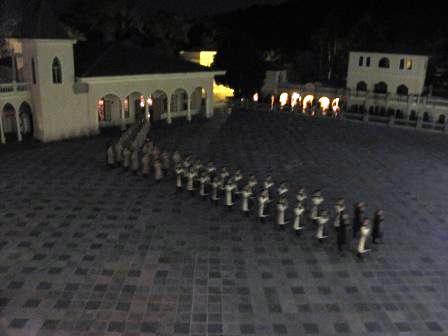
From dinner to Complines
We wanted show you this wonder to let you participate in our joy. If you ever find yourself in São Paulo, Brazil, come visit us!
This is a first post on Tabor and we hope to post more. We’ ll be putting things on the daily life and activities of the Heralds of the Gospel in Thabor and Our Lady of the Rosary Church.
The pictures are all thanks to our seminarians there who run a blog on the seminary. Please visit them! thabor.blog.arautos.org




